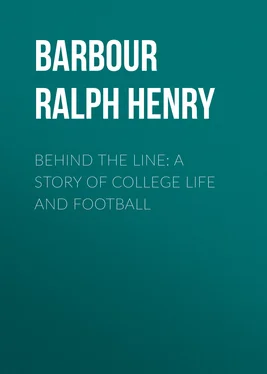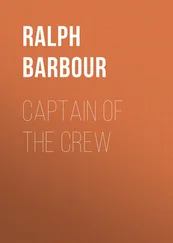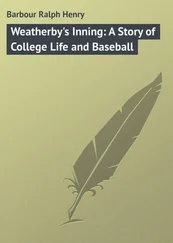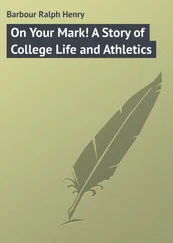Ralph Barbour - Behind the Line - A Story of College Life and Football
Здесь есть возможность читать онлайн «Ralph Barbour - Behind the Line - A Story of College Life and Football» — ознакомительный отрывок электронной книги совершенно бесплатно, а после прочтения отрывка купить полную версию. В некоторых случаях можно слушать аудио, скачать через торрент в формате fb2 и присутствует краткое содержание. Жанр: foreign_children, foreign_antique, foreign_prose, на английском языке. Описание произведения, (предисловие) а так же отзывы посетителей доступны на портале библиотеки ЛибКат.
- Название:Behind the Line: A Story of College Life and Football
- Автор:
- Жанр:
- Год:неизвестен
- ISBN:нет данных
- Рейтинг книги:3 / 5. Голосов: 1
-
Избранное:Добавить в избранное
- Отзывы:
-
Ваша оценка:
- 60
- 1
- 2
- 3
- 4
- 5
Behind the Line: A Story of College Life and Football: краткое содержание, описание и аннотация
Предлагаем к чтению аннотацию, описание, краткое содержание или предисловие (зависит от того, что написал сам автор книги «Behind the Line: A Story of College Life and Football»). Если вы не нашли необходимую информацию о книге — напишите в комментариях, мы постараемся отыскать её.
Behind the Line: A Story of College Life and Football — читать онлайн ознакомительный отрывок
Ниже представлен текст книги, разбитый по страницам. Система сохранения места последней прочитанной страницы, позволяет с удобством читать онлайн бесплатно книгу «Behind the Line: A Story of College Life and Football», без необходимости каждый раз заново искать на чём Вы остановились. Поставьте закладку, и сможете в любой момент перейти на страницу, на которой закончили чтение.
Интервал:
Закладка:
"You always were a raven, chum," he would exclaim. "Wait until Thursday night."
And Neil, without much hope, waited.
CHAPTER V
AND SHOWS HIS METTLE
The freshman election took place in one of the lecture rooms of Grace Hall. There was a full attendance of the entering class, while the absence of sophomores was considered by those who had heard of former freshman elections at Erskine as something unnatural and of evil portent.
Paul, robbed of the support of Tom Cowan's presence, was noticeably ill at ease, and for the first time appeared to be in doubt as to his election. Fanwell Livingston was put in nomination by one of his St. Mathias friends in a speech that secured wide applause, and the nomination was duly seconded by a red-headed and very eloquent youth who, so Neil learned, was King, the captain of the St. Mathias baseball team of the preceding spring.
"Are there any more nominations?" asked the chairman, a member of the junior class.
South, a Hillton boy, arose and spoke at some length of the courage and ability for leadership of one of whom they had all heard; "of one who on the white-grilled field of battle had successfully led the hosts of Hillton Academy against the St. Eustace hosts." (Two St. Eustace graduates howled derisively.) South ended in a wild burst of flowery eloquence and placed in nomination "that triumphant football captain, that best of good fellows, Paul Dunlop Gale!"
The applause which followed was flattering, though, had Paul but known it, it was rather for the speech than the nominee. And the effect was somewhat marred by several inquiries from different parts of the hall as to who in thunder Gale was. Neil secured recognition ere the applause had subsided, and seconded the nomination. He avoided rhetoric, and told his classmates in few words and simple phrases that Paul Gale possessed pluck, generalship, and executive ability; that he had proved this at Hillton, and, given the chance, would prove it again at Erskine.
"Gale is a stranger to many of you fellows," he concluded, "but, whether you make him class president or whether you give that honor to another, he won't be a stranger long. A fellow that can pilot a Hillton football team to victory against almost overwhelming odds and through the greatest of difficulties as Gale did last year is not the sort to sit around in corners and watch the procession go by. No, sir; keep your eye on him. I'll wager that before the year's out you'll be prouder of him than of any man in your class. And, meanwhile, if you're looking for the right man for the presidency, a man that'll lead 1905 to a renown beside which the other classes will look like so many battered golf-balls, why, I've told you where to look."
Neil sat down amid a veritable roar of applause, and Paul, totally unembarrassed by the praise and acclaim, smiled with satisfaction. "That was all right, chum," he whispered. "I guess we've got them on the run, eh?"
But Neil shook his head doubtfully. Cries of "Vote! Vote!" arose, and in a moment or two the balloting began. While this was proceeding announcement was made that the annual Freshman Class Dinner would be held on the evening of the following Monday, October 7th. When the cheers occasioned by this information had subsided the chairman arose.
"The result of the balloting, gentlemen," he announced, "is as follows: Livingston, 97; Gale, 45. Mr. Livingston is elected by a majority of 52."
Shouts of "Livingston! Livingston! Speech! Speech!" filled the air, and were not stilled until some one arose and announced that the president-elect was not in the hall. Paul, after a glance of bewilderment at Neil, had sat silent in his chair with something between a sneer and a scowl on his face. Now he jumped up.
"Come on; let's get out of here," he muttered. "They act like a lot of idiots." Neil followed, and they found themselves in a pushing throng at the door. The chairman was vainly clamoring for some one to put a motion to adjourn, but none heeded him. The crowd pushed and shoved, but made no progress.
"Open that door," cried Paul.
"Try it yourself," answered a voice up front. "It's locked!"
A murmur arose that quickly gave place to cries of wrath and indignation. "The sophs did it!" "Where are they?" "Break the door down!" Those at the rear heaved and pushed.
"Stop shoving, back there!" yelled those in front. "You're squashing us flat."
"Everybody away from the door!" shouted Neil. "Let's see if we can't get it open." The fellows finally fell back to some extent, and Neil, Paul, and some of the others examined the lock. The key was still there, but, unfortunately, on the outside. Breaking the door down was utterly out of the question, since it was of solid oak and several inches thick. The self-appointed committee shook its several heads.
"We'll have to yell for the janitor," said Neil. "Where does he hang out?"
But none knew. Neil went to one of the three windows and raised it. Instantly a chorus of derision floated up from below. Gathered almost under the windows was a throng of sophomores, their upturned faces just visible in the darkness.
"O Fresh! O Fresh!" "Want to come down?" "Why don't you jump?" These gibes were followed by cheers for "'04" and loud groans. Neil turned and faced his angry classmates.
"Look here, fellows," he said, "we don't want to have to yell for the janitor with those sophs there; that's too babyish. The key's in the outside of the lock. I think I can get down all right by the ivy, and I'll unlock the door if those sophs will let me. If two or three of you will follow I guess we can do it all right."
"Bully for you!" "Plucky boy!" cried the audience. But for a moment none came forward to share the risk. Then Paul pushed his way to the window.
"Here, I'll go with you, chum," he said, with a suggestion of swagger. "We can manage those dubs down there alone. The rest of you can sit down and tell stories; we'll let you out in a minute," he added scathingly.
"That's Gale," whispered some one. "Fresh kid!", added another angrily. But the gibe had the desired effect. Four other freshmen signified their willingness to die for their class, and Neil climbed on to the broad window-sill. His reappearance was the signal for another outburst from the watching sophomores.
"Don't jump, sonny; you may hurt yourself." "He's going to fly, fellows! Good little Freshie's got wings!" "Say, we'll let you out in the morning! Good-night!"
But when Neil, divesting himself of coat and shoes, swung out and laid hold of the largest of the big ivy branches that clung there to the wall, the jeers died away. The hall where the meeting had been held was on the third floor, and when Neil stepped from the window-sill he hung fully twenty-five feet from the ground. The ivy branch, ages old, was almost as large as his wrist, and quite strong enough to bear his weight just as long as it did not tear from its fastenings. Whether it would hold in place remained to be seen. Neil judged that if he could lower himself fifteen feet by its aid he could easily drop the rest of the distance without injury. The window above was black with watchers as he began his journey, and many voices cheered him on. Paul, his feet hanging over the black void, sat on the narrow ledge and waited his turn.
"Go fast, chum," he counseled, "but don't lose your grip. I'll wait until you're down."
"All right," answered Neil. Then, with a great rustling of the thick-growing leaves, he lowered himself by arm's lengths. The vine swayed and gave at every strain, but held. From below came the sound of clapping. Hand under hand he went. The oblong of faint light above receded fast. His stockinged feet gripped the vine tightly. In the group of sophomores the clapping grew into cheers.
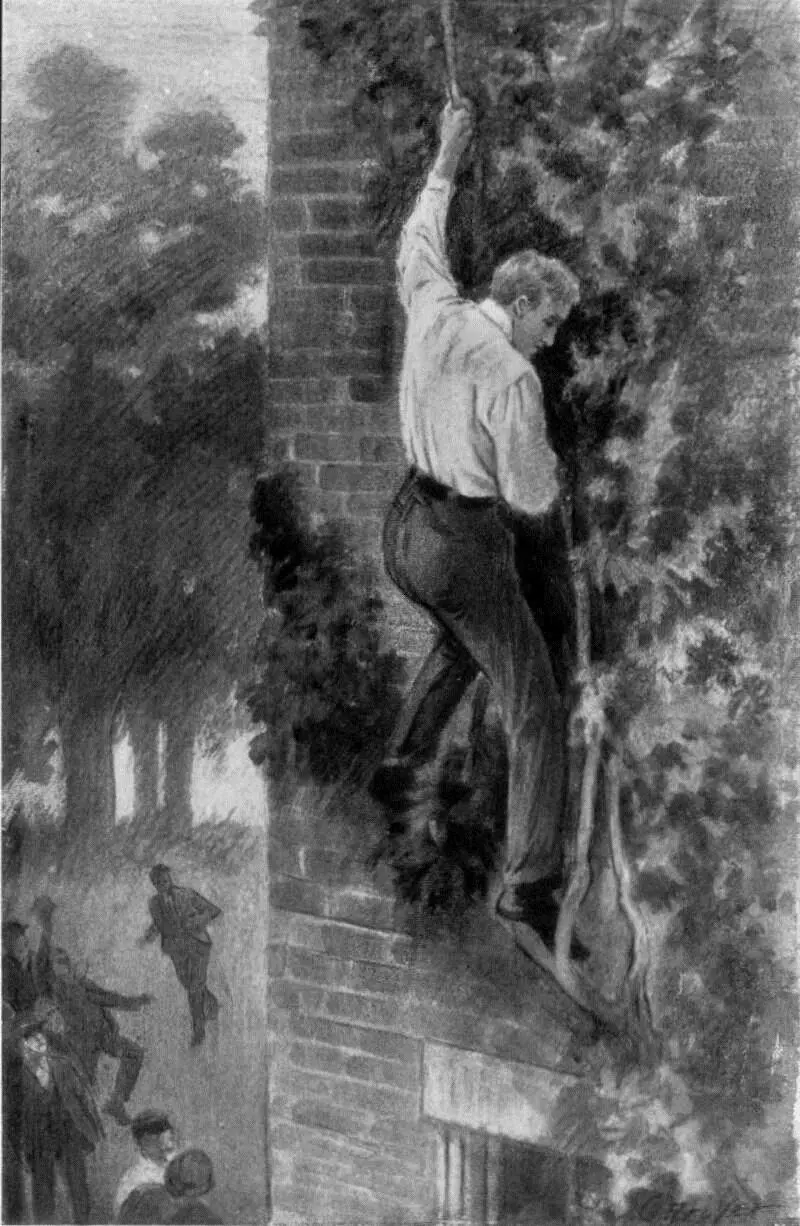
The vine swayed at every strain.
Читать дальшеИнтервал:
Закладка:
Похожие книги на «Behind the Line: A Story of College Life and Football»
Представляем Вашему вниманию похожие книги на «Behind the Line: A Story of College Life and Football» списком для выбора. Мы отобрали схожую по названию и смыслу литературу в надежде предоставить читателям больше вариантов отыскать новые, интересные, ещё непрочитанные произведения.
Обсуждение, отзывы о книге «Behind the Line: A Story of College Life and Football» и просто собственные мнения читателей. Оставьте ваши комментарии, напишите, что Вы думаете о произведении, его смысле или главных героях. Укажите что конкретно понравилось, а что нет, и почему Вы так считаете.
